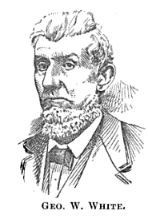 The Civil War years are a time of story-telling, corporately and personally. Soldiers and civilians on both sides oftentimes pass along personal stories that reinforce sectional pride and prejudices. The truth of such stories typically cannot be qualified, yet the stories themselves convey truths that transcend questions of factual accuracy.
The Civil War years are a time of story-telling, corporately and personally. Soldiers and civilians on both sides oftentimes pass along personal stories that reinforce sectional pride and prejudices. The truth of such stories typically cannot be qualified, yet the stories themselves convey truths that transcend questions of factual accuracy.
One of the tens of thousands of stories surrounding the war involves George W. White, born in 1807 Henry County, Kentucky. Baptized a Missionary Baptist in 1836, White “began immediately to preach.” For most of the rest of his life, he serves numerous churches first in Tennessee, then in Missouri. It is while pastoring in Missouri during the war that the following story happens, and is accordingly passed down in the annuls of local Baptist history.
It was at a time when a great many southern sympathizers were being reported as aiding and abetting southern soldiers. One day a company of German federal troops came to his [White’s] house and in a very insolent manner demanded of him his “arms,” (meaning fire arms.) He told them he would surrender them, but when he handed them his Bible and hymn book, telling them these were his only arms and that if they could use them to better advantage than he could, they were welcome to them, they stole away in a shamefaced manner.
Like so many personal stories of the war era, the dating of White’s confrontation with the hostile federal troops is unknown. It could well have happened about this time during the war, as Union troops in Missouri remain diligent in the task of preventing a southern insurrection in the volatile western state. And like so many other stories related by Baptists North and South, allegiance to the Bible is alluded to as the measure of righteousness of their respective nations.
Baptists, after all, pride themselves as “people of the Book,” their widely varying viewpoints and interpretations not preventing opposing ideologies from each proclaiming their own certainty of truth.
Elder George W. White survives the war and pastors for many more years, dying in Missouri in 1896.
Source: J. W. Haines, The History of the Polk County Baptist Association, Bolivar, Mo.: The Bolivar Herald, 1897, pp. 192-193 (link)


